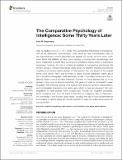The Comparative Psychology of Intelligence: Some Thirty Years Later
Author(s)
Pepperberg, Irene M
DownloadPublished version (351.0Kb)
Publisher with Creative Commons License
Publisher with Creative Commons License
Creative Commons Attribution
Terms of use
Metadata
Show full item recordAbstract
After re-reading Macphail’s (1987) essay “The Comparative Psychology of Intelligence” with all the associated commentaries, I was struck by how contemporary many of the arguments and counter-arguments still appear. Of course, we now know much more about the abilities of many more species (including their neurobiology) and fewer researchers currently favor explanations of behavior based solely on associative processes; however, the role of contextual variables in comparative psychology still remains cloudy. I discuss these issues briefly. Given my research interests involving the cognitive and communicative abilities of Grey parrots, the one aspect of the original article upon which I feel I can comment in depth involves Macphail’s claims about the importance of language—and specifically syntax—in problem-solving and thus in placing humans above all other creatures. Granted, no other species has (or in my opinion is likely ever to acquire) everything that goes into what is considered “human language.” Nevertheless, several other species have acquired symbolic representation, and considerable information now exists upon which to base an argument that such acquisition by itself enables more complex and “human-like” cognitive processes. Such processes may form the basis of the kind of intelligence that is measured—not surprisingly—with human-based tasks, including the use of such representations as a means to directly query non-human subjects in ways not unlike those used with young children.
Date issued
2020-05Department
Massachusetts Institute of Technology. Media Laboratory; Massachusetts Institute of Technology. Department of Brain and Cognitive SciencesJournal
Frontiers in Psychology
Publisher
Frontiers Media SA
Citation
Pepperberg, Irene M. "The Comparative Psychology of Intelligence: Some Thirty Years Later." Frontiers in Psychology 11 (May 2020): 973 © 2020 Pepperberg
Version: Final published version
ISSN
1664-1078